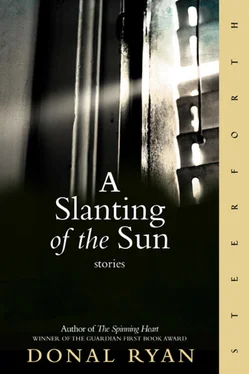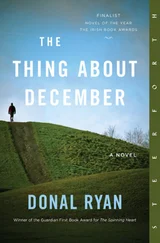I feel the closeness now of my end. I fell asleep in this chair the other evening and I woke of a sudden and the flickering television was gone and that whole end wall of the day room was bathed in light and all my blank-faced comrades were gone, replaced with a rank of winged creatures, at once transparent and solid, real and unreal, and at the centre of this apparition was a staircase of shimmering gold, and I wanted to raise myself and walk to it and put my foot on the first riser and look up to see could I know from the bottom what lay waiting at the top, but I found myself unable to move. I feel the breath on my forehead of an admonishing god. Or a finger-wagging saint at least, with plenipotentiary discretion. I’ll be stopped for sure at the summit of those stairs, if I ever have the strength to climb them, and told Go back, you must wait, you must atone, and I’ll state my case that I’ve atoned enough, each day since our summary execution of that wild boy. I haven’t had a moment’s ease since, not even in my hard-got sleep.
We swaddled him in canvas and we buried him fine and deep and we swept and fixed the earth above his grave and scattered twigs and leaves across it so that it would appear undisturbed and we said no prayer over it only stood for a moment in a half-circle with our eyes cast down and filed back down that hillside to the van and once again into the cold arms of the waiting years.
There’s a weighing scales in the tiny cubicle of a bathroom in my room and I step up onto it every morning before my ablutions so I can chart in my mind the disintegration of myself, my falling away to nothing, quarter-pound by quarter-pound, a bag of sucky sweets a day. I’m not afraid to die and leave this place of sinners and sinned-against, guilty and innocent, and they all enmeshed and melded so no one is without stain, where only the faces of infant children are cast unsullied on the world, their only sin being done long ago by imaginary people in the pages of a book written by ancient men. I’m not even afraid or sad to leave my dear John P alone here because he’ll know next to nothing of my passing and what sense he might have of an empty place beside him where once I sat will fade from him like a ghost in sunlight.
No good came of it. That’s the miserable honest truth of it. John P’s daughter never emerged from her silence, only pulled it more and more tightly around herself until it suffocated her, and her body was never got from the roiling sea. Her neatly folded note had only one word on it: Sorry. Her car was parked tidily in a corner of the car-park across the road from the climbing walk to the cliffs. It had a ticket on the dashboard to show she had paid as much for parking as the machine would allow her. The first three hours of her eternity were covered.
I know something of the bite and sting of the despair that led John P’s daughter along that rising path at Moher. The notion overtook me shortly after it was all done that, having taken a life, I had in some way forfeited my own. I would breathe, but each breath would increase the debt I owed the universe. I felt myself undeserving of my happy, healthy children, brimming with goodness and love, and I think now looking back I in some way set about sabotaging things; it seems for all the world now as though I dismantled myself as surely as did that lovely girl. She flung and dashed herself to pieces in a few short moments; I did the same over long years, in a way as quietly violent. My son and daughter drag themselves in here to look at me the odd evening and it’s as though they hate me: they huff and sigh and roll their eyes and pretend it’s their restless children they’re vexed with, and not me, not the memory of my tensed-up silent stewardship of the best part of their teenage years.
I fell into wickedness. I’d lose my reason over the tiniest of things: a murmur during the news; a clack and scrape of cutlery on a plate; a room not tightened to my liking. When they took to going out to discos I terrorized them. I harped and roared, and ridiculed my daughter’s frocks and tops and my son’s scraggy hair and torn trousers, and drove them everywhere even though they asked could they go on the bus with their pals and I’d sit outside and wait and bore holes in the walls of those places with my stares and I’d look in from the vestibule and their pals would see me and point and snigger and a time or two I marched in and enforced a distance between my daughter and a lad who looked as though he might be throwing shapes. My wife couldn’t understand it at first. What in the name of God has got into you? But soon my crossness became the way of things and she wrung her hands and shook her head and lived with it for thirty years.
John P cast himself into silence as surely as his bruised and wingless angel cast herself into the sea. It was as though he took the mantle of it from her. His wife withered and died and it seemed as though her fading and passing made no odds to him. And I felt only gratitude for his wordlessness: there was safety in it, and a measure of comfort. It was no bother at all to me to call to him after. Isn’t that strange, the ways of things, the ways of human minds? Once all our impecunious bargains had been done, I was free from my previous fear and unease and able again to cross my friend’s threshold and sit and chat of weather and sport and news and local intrigues and watch him watching out the window for something, something, I don’t know what. All old talk. Listening and nodding and watching. All of naught, to naught, for naught, year upon year of moments, of time slowly marked, of silence filled with empty words.
I often saw the outline of the boy after in the shapes of things living and dead, his head bowed, his body still tied fast, leaning forward from the filthy beam. In the gloaming especially, when spectres are born of shadows, in a tree in need of coppicing, say, or in a windblown fence, or in among a huddle of bulrushes. Some days in the mirror, looking at my monstrously normal face, I’d see reflected in the black parts of my eyes that ghostly post and its weight of torn flesh and shattered bones. And always those times a scream would rise in me and my blood would run to ice and my heart would spasm and pound.
I thought often of deserts in those wintry days, of walking into emptiness until my legs would carry me no further, of lying flat beneath a flaying sun, the flesh being cleansed from my bones, and they in turn being bleached white and dried to powder. That would be the death and disposal of my choosing, if I were able to grant myself the privilege of choice.
But here I am existing still.
SHE COULDN’T SLEEP past dawn for the sound of wind. It seemed always to funnel down this road, pressed to wild gusts between the rows of houses. She imagined the roof being lifted by the eaves or a felled oak smashing through the rafters. But there was no oak near them, no trees at all, only clematis bushes and half-hearted hedges and puny garden willows. They could hardly claim treehood, drippy things. Her husband always said he loved the howl of a storm and the rain battering off the window glass. It made him feel cosy, he said, to be in out of it, in a warm bed. And there was a contentment to his snores, for sure, as though the raging weather really did lull him deeper into peacefulness. She considered hanging a foot out the side of the bed and, when it was cold enough, pressing it against his lower back where his pyjama top always rode up, but she wasn’t sure she was still dextrous enough to pull it off. And she wasn’t sure she was wicked enough to wake him that way.
A familiar chirruping filled the spaces between gusts. February the skylark’s song always started. She’d been hearing him all week and she’d seen him skimming low across the green, landing on the edge of the rockery at its centre as she drove from the estate the morning before. She knew him by his raised plume, his rocker’s coif, like it was gelled to standing. The cut of a young fella going to a disco. The sound of him, and the thought of his little hairdo, and the idea of the cold-foot trick, and the roar her husband would let out of him, and the laugh that would be in his feck off combined to a warmth in her stomach, a childish thrill of pleasures. The wind eased with the brightening of the sky, and she lay still, happy almost, for the hour before the alarm, waiting for the grunting and scratching of her husband’s rising, his sighs and hums, the bellows and squeals of teenagers, the clomps and rattles of a waking house.
Читать дальше












